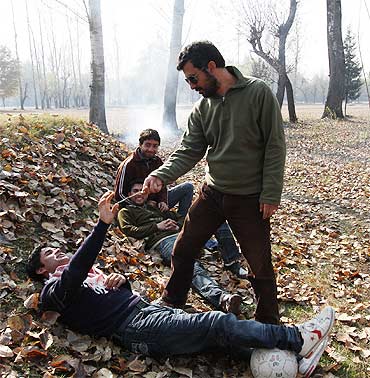
The Toronto International Film Festival, which starts today, will have an Indian touch to it. Besides Kiran Rao's Dhobhi Ghaat, Kashmiri filmmaker Aamir Bashir's Harud (Autumn) will have a world premiere there.
Before Bashir tried his hand at hand, he acted in a few films like Split Wide Open (1999), Clever and Lonely (2002), The Great Indian Butterfly (2007), Frozen (2007) and A Wednesday (2008).
He shares his excitement of travelling to Toronto with his directorial debut film, with Priyanka Jain.
How do you feel about arranging a premiere at the TIFF?
Harud is being showcased in the Discovery section at the TIFF. I am delighted because it's my first film and I find the idea of showing my film and talking about it to a varied audience all over the world very exciting.
My co-producer and cinematographer Shankar Raman and I will be going for the festival.
Who are you looking forward to meet at the festival?
I am looking forward to meeting Robert Redford and Clint Eastwood. They were the early influences of my acting career. When I was in school, I used to practise Clint Eastwood's Dirty Harry dialogues in front of a mirror.
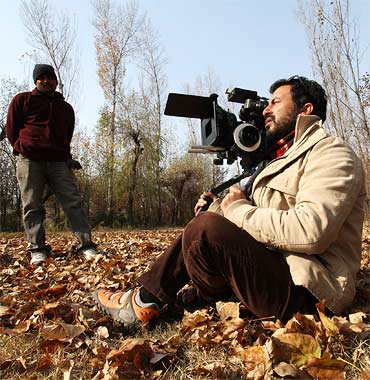
You were a television journalist before you joined films. How did that transition happen?
It wasn't planned. Nothing in my life has been planned. Television journalism wasn't the right opening for me at that time. I was working with Asian News International. It is actually a very small part of my life -- I was there for only six months.
I did not enjoy it because I did not get to do stories. It was a news agency. So they were more interested in collecting footage from all over the subcontinent. We used to compile that and write the script. So it was quite boring.
I moved to Star Plus's travel show The Great Escape in 1997, which was exciting. But I was hugely under paid and overworked, so I left after nine months. After that, I worked in a docudrama based on real life incidents in Sony Entertainment Television. I got a call for the television series Alp Viram and moved to Mumbai.
I have never done an acting course. I learnt everything on the job. I did television for five years until the daily soap phenomenon started.
When did you decide to direct?
The idea came about five years ago. I am not a writer so it took me time to develop the idea. The first half was written with the help of a friend Mehmood Farooqui, the scriptwriter of Peepli Live (Farooqui is married to Peepli Live director Anusha Rizvi). After he got busy with his own film, Shankar Raman and I re-wrote it.
After writing about five drafts, we went to Kashmir to see if our script would work in the present situation. We realised we had to rewrite a lot. My film is more about what people go through mentally.
Most of the film has been shot in Srinagar, Pahalgam and Gulmarg.
I am from Srinagar. I have lived in Kashmir for 20 years so I have a unique perspective of the place and its issues. I can relate to it. But I have not had the same experiences as the people who are still living there. My memories of Kashmir are very idyllic and peaceful. I left Kashmir in 1990. But I visit about once or twice a year because my family is still there.
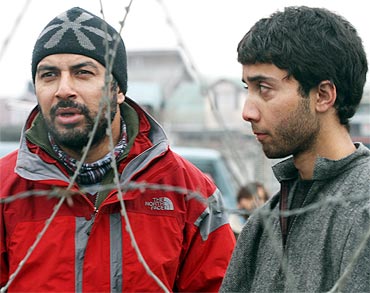
How was it shooting in your homeland?
We were shooting on a tight budget and didn't have too many resources. We had a crew of 18 people, so it was tough. People are very suspicious of anyone coming with a camera because they are concerned about the way they are portrayed.
I had to tell them that I was a Kashmiri myself and give them an outline of the story. I told them there are no heroes or villains.
Although the government says you are welcome to shoot here, they are wary because of the kind of films that has been made. Even the police are suspicious. They keep an eye on you all along.
Bollywood filmmakers portray them as violent people. We are not doing that.
Was it nostalgic shooting in your hometown?
Yes. The stress levels in Kashmir are very high. It is very beautiful geographically but that's only for a short period of time because sooner or later, the situation takes you in. So in that sense, it is not an easy place to be. I felt like an outsider. My classmates look at least 10 years older than me.
My film is about that stress, about the psychological damage that people have gone through.
Which Kashmir-related film do you think has showed its problems best?
A documentary called Yi As Akh Padshah Bai (There Was a Queen) by Kavita Pai and Hansa Thapliyal. It is about women who lost either their son or husband and don't know whether they are dead or alive, and the government not cooperating. Then there is a documentary made by Sanjay Kak called Jashn e Azaadi.
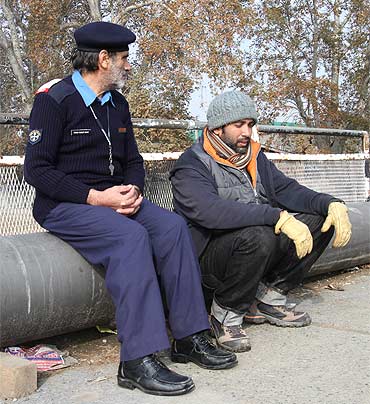
How did you rope in Iranian actor Reza Naji (who won the Silver Bear at the Berlin Film Festival)?
Reza had worked with (Iranian filmmaker) Majid Majidi. I had done some work for Majidi and asked him to introduce us. Reza has a very cinematic and rugged face. He was perfect for this character. I had asked Naseeruddin Shah first but he didn't have the dates.
What about the rest of the cast? You said they were all non-actors.
Naseeruddin Shah was conducting a workshop for young people in Kashmir, who had no prior experience of acting. I went to his workshop looking for people to cast in the film. I cast four of them.
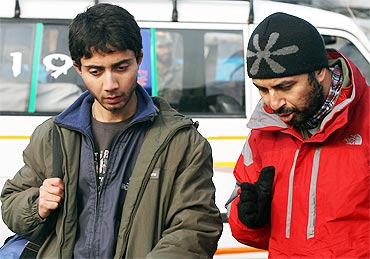
You have also produced the film. How did you raise the money?
First, we tried to get producers to make it. Knowing our script, going to a conventional producer did not make sense. There is no glamour element involved, no song and dance. So we went to people we thought would be interested in this alternative kind of film. But the kind of money they were offering... we felt we could raise that money ourselves. So Shanker Raman and I decided to produce it ourselves.
We had Rs 30 lakh initially. After that, it was either on credit or we -- including associate director Rucha Pathak -- chipped in. The film was finally made with Rs 2 crores.
Cinematographer Shanker Raman got a National Award for Frozen and has also been acclaimed for his work in Peepli Live. Tell us about the visual aspect of the film.
I have known Shanker since college. He is a close friend. We had worked on The Great Indian Butterfly before. He brings an aesthetic eye which you don't get to see in films on a regular basis. He is one of the best cinematographers in the world.
When do you plan to release the film in India?
Hopefully once we have built credibility internationally, we will come and meet more people. We are also exploring the international market.
Will you continue acting after that?
Yes, absolutely. Otherwise how will I make money?